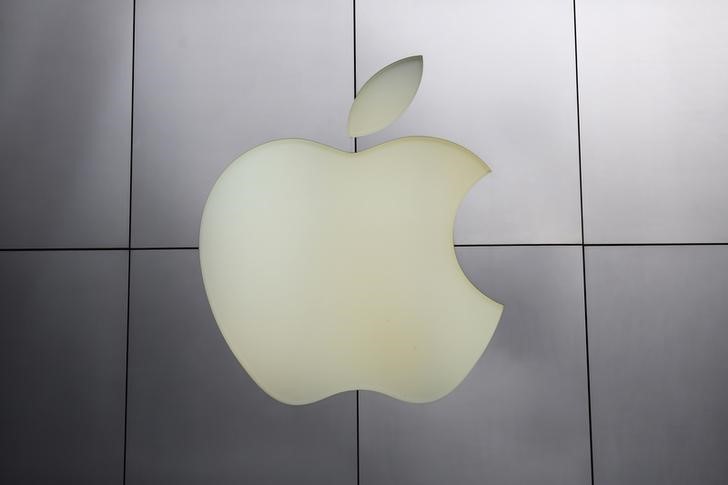* Apple shares hit all-time top after results
* Dow Jones Industrials breaks 22,000 level
* Dollar holds at 15-month lows (Updates close of European markets)
By Chuck Mikolajczak
NEW YORK, Aug 2 (Reuters) - A gauge of world stocks edged lower on Wednesday even as Wall Street's venerable Dow Jones Industrial Average broke the 22,000 barrier on strength in Apple AAPL.O shares, while the U.S. dollar held near 15-month lows on doubts about another rate hike this year.
Shares of Apple, the largest U.S. company by market capitalization, were up 4.99 percent at $157.53 after hitting a record high of $159.75 in the wake of its earnings, helping lift the Dow above the key 22,000 mark. reported better-than-expected iPhone sales, revenue and earnings-per-share and signaled its upcoming 10th-anniversary phone is on schedule. Apple's gains were not enough to prop up the broader U.S. stock indexes, with the benchmark S&P 500 and Nasdaq both lower.
"That Dow 22,000 mark, that is really a significant number, it is a milestone in the market. Pushing through that is tough, it takes more than one company to push us through, it really takes something kind of extraordinary," said Jeff Kravetz, regional investment director at U.S. Bank Wealth Management in Scottsdale, Arizona.
"What happens is when we reach these levels, like 21,000 or 22,000 on the Dow, there is a tendency for investors to take profits and pull back a little bit."
The Dow Jones Industrial Average .DJI rose 39.42 points, or 0.18 percent, to 22,003.34, the S&P 500 .SPX lost 2.25 points, or 0.09 percent, to 2,474.1 and the Nasdaq Composite .IXIC dropped 7.48 points, or 0.12 percent, to 6,355.46.
The pan-European FTSEurofirst 300 index .FTEU3 lost 0.41 percent and MSCI's gauge of stocks across the globe .MIWD00000PUS shed 0.02 percent.
European shares were weighed down by declines in banking .SX7P and mining .SXPP shares. U.S. dollar hit its lowest level against the euro in more than 2-1/2 years on uncertainty over the path of interest rate hikes for the Federal Reserve this year and expectations for European Central Bank hawkishness. U.S. inflation along with political turmoil in Washington has lessened the possibility of another Federal Reserve rate hike this year.
Improving data in other major economies has also served to push the greenback down nearly 11 percent from January highs, benefiting commodities and emerging markets.
The dollar index .DXY fell 0.37 percent, after touching 92.548, the lowest since early May 2016. The euro EUR= up 0.68 percent to $1.1881.
Investors also dealt with conflicting statements from Federal Reserve officials.
St. Louis Federal Reserve James Bullard is opposed to further U.S. interest rate increases by the central bank, Market News International reported, and warned that more hikes could hinder domestic inflation. Fed President Loretta Mester, however, said the Fed should remain focused on gradually tightening U.S. policy because one-off factors, not a long-lasting trend, have caused inflation to weaken in recent months. private employers added 178,000 jobs in July, below economists' expectations, a report by a payrolls processor showed on Wednesday, ahead of the U.S. Labor Department's more comprehensive non-farm payrolls report on Friday. profits for the second quarter have been strong, with earnings growth currently at 11.4 percent, according to Thomson Reuters data. Of the 350 companies in the S&P 500 that have reported through Wednesday morning, 70 percent have topped expectations.
Benchmark 10-year notes US10YT=RR last fell 3/32 in price to yield 2.2621 percent, from 2.251 percent late on Tuesday.
U.S. crude CLcv1 rose 0.41 percent to $49.36 per barrel and Brent LCOcv1 was last at $52.08, up 0.58 percent on the day.
<^^^^^^^^^^^^^^^^^^^^^^^^^^^^^^^^^^^^^^^^^^^^^^^^^^^^^^^^^^^ Global assets in 2017
http://reut.rs/1WAiOSC Global currencies vs. dollar
http://tmsnrt.rs/2egbfVh Global bonds dashboard
http://tmsnrt.rs/2fPTds0 Emerging markets in 2017
http://tmsnrt.rs/2ihRugV
^^^^^^^^^^^^^^^^^^^^^^^^^^^^^^^^^^^^^^^^^^^^^^^^^^^^^^^^^^^> (Editing by Bernadette Baum and Nick Zieminski)
